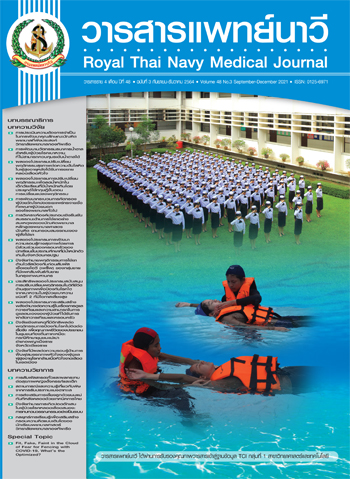Development of DM Bank Innovation for Uncontrolled Type II Diabetes Mellitus Patients
Main Article Content
Abstract
The objective of this research and development study was to develop and test the effectiveness of DM bank innovation of type II diabetes mellitus patients from the municipal communities of Angthong province. The process consisted of 3 stages: 1) study the problems and needs 2) DM bank innovation development, validation, and pilot study. 3) applying DM bank innovation to test effectiveness. The 35 uncontrolled diabetes mellitus patients were recruited by purposive sampling. The research instruments were composed of 1) the diabetes knowledge and self-care behavior questionnaire which was developed by the researchers. The content validity index was proved at 0.85 through three expert inspections. The Cronbach’s alpha coefficient was used to test the reliability at 0.84. 2) DM bank innovation proved the content validity index at 0.90. This research was conducted during January - September 2017. Data were analyzed using descriptive statistics and paired sample t-test inferential statistics.
The results showed that DM bank innovation was developed based on the concept of bank services, protection - motivation theory, and empowerment theory. The main activities were deployed 1) to deposit sugar levels that they can control or reduce the redemption of everyday essential materials, 2) health educating, 3) motivating from role model, 4) consciousness planting activities, and 5) health planting activities. After joining the DM bank innovation for six months; uncontrolled diabetic mellitus patients 1) had statistically significant higher knowledge score and a higher self-care behavioral score than before participating the DM bank innovation at .05. 2) weight, body mass index, and clinical outcomes included fasting plasma glucose, hemoglobin A1c, creatinine, and urine micro-albumin were significantly lower than before participating the DM bank innovation at .05.
The result indicated that DM bank innovation was effective in improving knowledge and self-care behavior, decrease body weight, body mass index, fasting plasma glucose, hemoglobin A1c, creatinine, and urine micro-albumin in uncontrolled diabetes mellitus patients.
Article Details

This work is licensed under a Creative Commons Attribution-NonCommercial-NoDerivatives 4.0 International License.
References
International Diabetes Federation. IDF Diabetes Atlas Ninth edition 2019. [Internet]. [cited 2017 September 1]. Available from: https://www.diabetesatlas.org.
International Diabetes Federation. IDF Diabetes Atlas Ninth edition 2019: factsheets. [Internet]. [cited 2017 September 1]. Available from: https://www.diabetesatlas.org.
Department of Disease Control, Ministry of Public Health. Nurses make the difference for diabetes. [Internet]. [cited 2020 November 12]. Available from: https://ddc.moph.go.th/brc/news.php?news=15591&deptcode=brc. (in Thai).
Health Data Center, Ministry of Public Health. Diabetes mellitus statistic. [Internet]. [cited 2016 June 4]. Available from: https://hdcservice.moph.go.th/hdc/main/index_pk.php. (in Thai).
Rakkwamsuk S, Reunreang T. Factors predicting health behaviors among type 2 diabetes patients dwelling in Mueng district, Chon Buri province. Royal Thai Navy Medical Journal 2020;47(3):544-60. (in Thai).
Gibson CH. A concept analysis of empowerment. Journal of Advanced Nursing 1991;16(3):354-61.
Vibulchai N, Sridech R. Development of a Program to enhance the motivation for self-management in delaying the diabetes nephropathy progression of type 2 diabetes patients with hypertension. Royal Thai Navy Medical Journal 2020;47(2):373-93. (in Thai).
Siri T. Empowerment program with goal setting for type 2 diabetes patients’ self-care behaviors at Somdejprajoataksinmaharaj hospital, Tak province. [Master’s Thesis, Faculty of Public Health]. Mahidol University; 2008. (in Thai).
Koyun S. Effects of empowerment in patients with diabetes mellitus type 2 and their families on their perception of control in illness management. [Master’s Thesis, Faculty of Nursing]. Khon Kaen University; 2007. (in Thai).
Praikheaw S. Effects of empowerment program at home on self-esteem and self-efficacy in diabetes mellitus type 2 aging patients and their families. [Master’s Thesis, Faculty of Nursing]. Khon Kaen University; 2009. (in Thai).
Boonyuen N. The effect of empowerment process on self-care behaviors and levels of hemoglo-bin A1C in elderly diabetic patients. [Master’s Thesis, Faculty of Nursing]. Naresuan University; 2006. (in Thai).
Rogers RW. Cognitive and physiological processes in fear appeals and attitude change: a revised theory of protection motivation. In: Cacioppo JT, Petty RE, editors. Social psychophysiology. New York: Guilford Press; 1983. p. 153-76.
Nastasi BK, Schensul SL. Contributions of qualitative research to the validity of intervention research. Journal of School Psychology 2005;43(3):177-95.
Kongpunt P. Effects of health education programs based on protection motivation theory and social support on behaviors to prevent complications from kidney disease among type 2 diabetic patients. Journal of Phrapokklao Nursing College 2016;27(Suppl 1):28-42. (in Thai).
Suratana S, Sasivimonlux K, Wichairam N, Sonkhammee P. The result of motivation theory program application on blood sugar controlling the behavior of diabetic in Mae Kham sub-district, Mae Chan district, Chiang Rai province. The Office of Disease Prevention and Control 7 Khon Kaen 2018;25(3):11-9. (in Thai).
Phongprapapan P, Sanveingchan S, Panya P. The process of empowerment on health behavior changes for diabetic patients at Wat Puranavas community. Nursing Journal of the Ministry of Public Health 2011;21(2):65-73. (in Thai).
Hoiyeephu J. Effects of empowerment process with motivational interviewing on self-care behavior change for patients with uncontrolled diabetes mellitus at Mae-on hospital, Chiang Mai province. Journal of Suan Prung 2016;32(3):28-43. (in Thai).
Kritsumpan K. The effect of empowerment on self–care behaviors and glycemic control in patients with type 2 diabetes mellitus at diabetic clinics, Samngao hospital, Tak province. Journal of Health Sciences Scholarship 2019;6(2):78-93. (in Thai).
Plainu C, Durongrittichai V, Khungtumneum K, Rattanamongkolgul S. Participatory empowerment to promote adaptive behavior to control blood sugar levels of diabetic clients. Journal of Public Health Nursing 2018;32(1):137-55. (in Thai).


